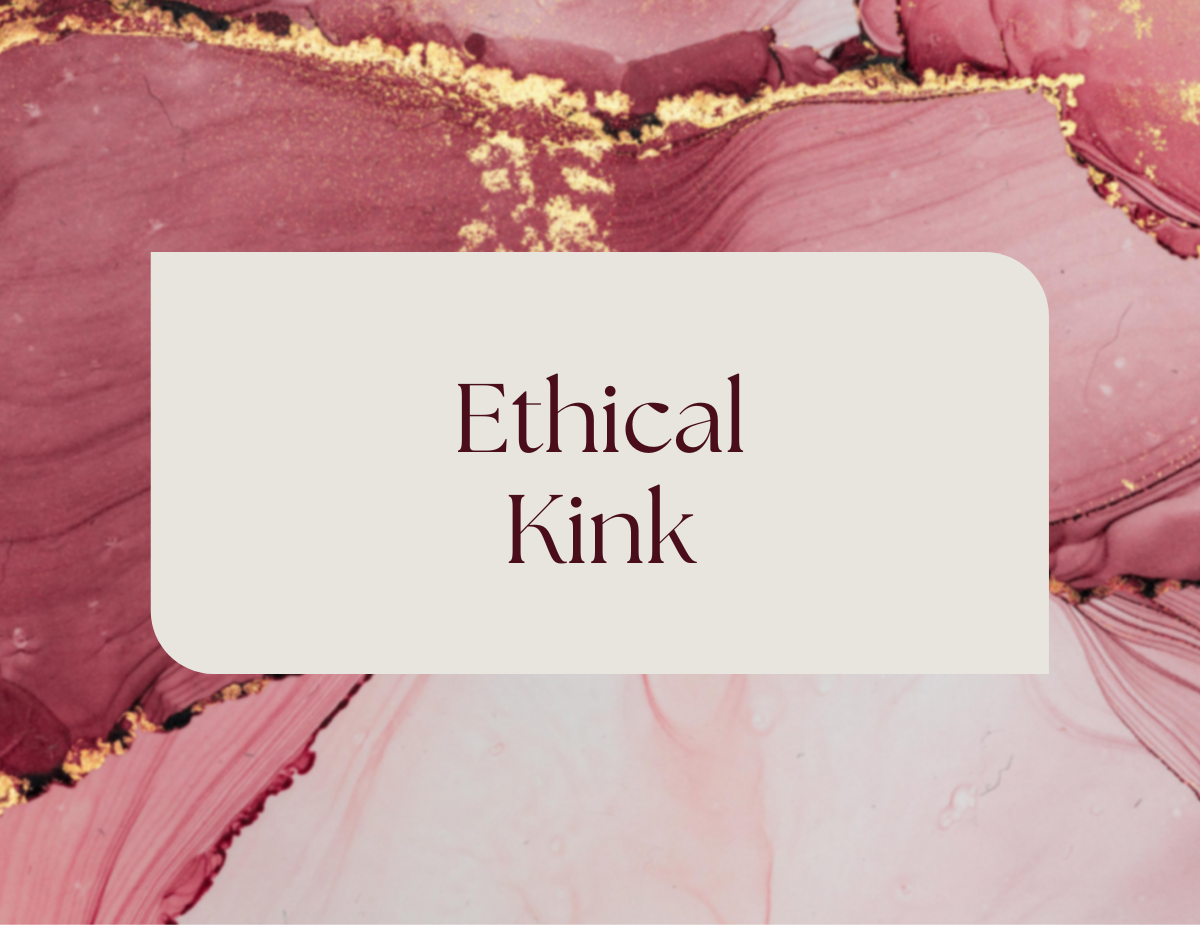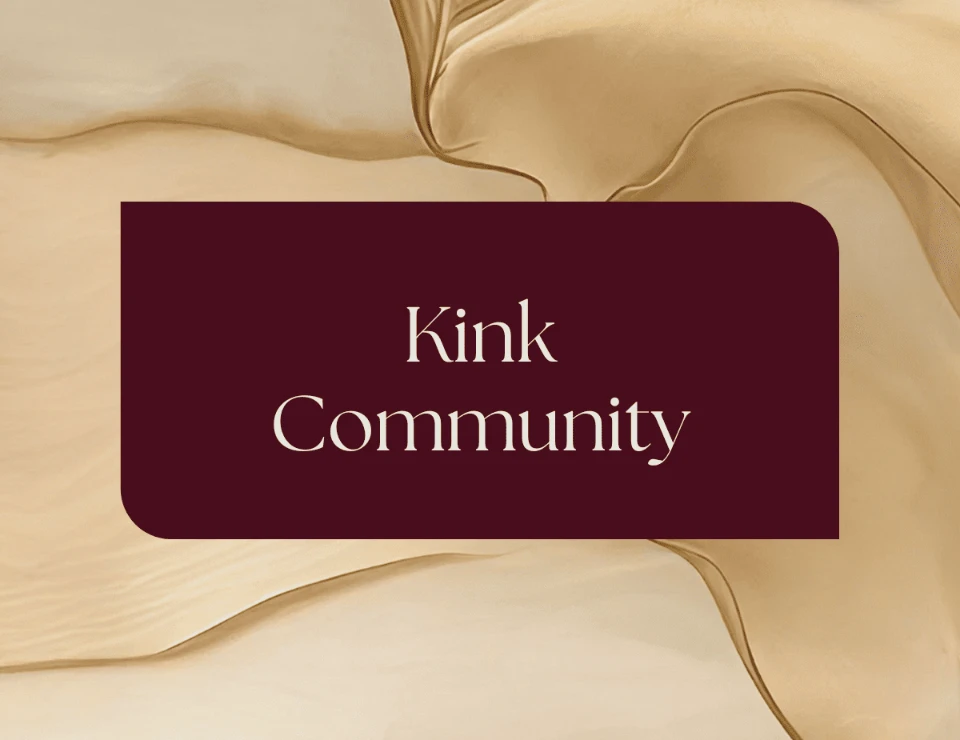The conversation around Ethical Kink is constantly evolving.
We all know that in the kink world, ethics are everything. Whether you're deep in the BDSM* scene or exploring your first fetish*, knowing how to play safely, consensually, and responsibly is what separates empowering kink play from harmful experiences.
And ethical kink is the framework that holds it together, keeping individuals safe, respected, and free to explore. Let’s dive in a little deeper.
What is Ethical Kink?
Ethical kink puts consent, care, pleasure, and communication at the core of every dynamic. It honours identity, boundaries, and safety in equal measure.
But isn’t all kink ethical? Well, no, actually. The term kink actually refers to sexual activities and desires that sit outside of what is seen as the “norm” in society or unusual sexual preferences. And kink itself is often connected to trust, respect, boundaries, consent and safety.
But Ethical kink has all of that at its beating heart. Safety and consent is not a tag-on. It’s the centre of everything - but where does it come from?
*Bondage and Discipline, Dominance and Submission, Sadism and Masochism
*A fetish is a specific sexual focus or desire, often on an object, body part, or act.
Understanding kink culture
Kink has always been about pushing boundaries with intention and respect.
Within kink communities, there is a strong sense of shared responsibility. We protect each other. We learn from each other. We hold each other accountable. This is where ethics come in.
The idea of ethical kink began to take shape in the late 20th century. Many of its roots lie in underground queer and leather scenes, where people started gathering more formally.
Early munches and play events were as much about sharing safety knowledge as they were about play itself. They created space for newcomers to learn how to explore without harm.
At the time, public misunderstanding and media moral panics were common. So leaders in the scene worked to define collective standards — like Safe, Sane, and Consensual (SSC) and later Risk-Aware Consensual Kink (RACK).
These frameworks showed the outside world, and the community itself, that kink could be responsible, respectful, and rooted in informed consent.
Ethical kink is about creating a culture where people feel safe to be vulnerable, curious, and adventurous. Sometimes that means stepping in when you see unsafe practices. Sometimes it’s helping build inclusive spaces where all voices are heard.
As kink becomes more visible, conversations about how to practise it ethically become even more important. Whether it’s role-play, rope work, or kinky sex, the focus should always on consent, safety, and mutual respect. Visibility brings opportunities for education and connection. It also carries a responsibility.
Evolution of kink practices
Kink once lived underground, shared quietly among those who knew where to look. Privacy was essential to avoid stigma or personal risk.
In recent years, kink has become more visible, creating more places where newcomers can link up with experienced players, learn safety skills, and join inclusive communities. For a long time, most organised kink spaces were in major cities.
Now, kink-friendly workshops and kink-friendly clubs can be found in smaller towns and have even been covered in mainstream media. This has brought more new people in, creating opportunities for learning and connection, but also making clear ethics even more important.
The community’s answer is stronger consent guidelines, beginner-friendly events, and education that keeps exploration safe, whether it is over coffee at a munch or inside a sex dungeon.
Past misconceptions and stigmas
For decades, headlines painted kink bad and dangerous, ignoring the truth about consent and care. Kink was labelled as dangerous or deviant and often linked to abuse in the public imagination, without any understanding of the role of consent or safety.
Stigma painted kinksters as dangerous or broken in stark contrast to the reality - just human beings with varied desires. The reasons people explore kink are as diverse as the people themselves.
It's taken a long time to get to where we are, but even now, these outdated beliefs still influence how some people see themselves or others in the community. Shame and secrecy have kept many from exploring their desires.
Ethical kink pushes back against this. It shows that with clear agreements, informed choices, and respect, what once carried stigma can become a source of trust, intimacy, and even joy.
The foundations of Ethical Kink
1. Consent as a cornerstone
Consent is not a checkbox. It is an ongoing, enthusiastic agreement between all parties. Ethical kink makes consent in all sexual conduct explicit, informed, and revocable at any time. There’s no such thing as “implied consent” in ethical kink.
That means discussing what you want to explore, what you don’t, and how you’ll communicate during a scene. It means agreeing on safe words* before play starts and being prepared to stop the moment they’re used. It also means checking in afterwards to see how everyone feels physically and emotionally.
Consent is built on honesty. It works best when everyone is encouraged to speak up, even if it feels awkward. In many BDSM communities, consent is seen as a skill you practice and refine, not something you assume will happen on its own.
*A safe word is a pre-agreed word or phrase used to stop a scene immediately for safety.
2. Communication: building trust and safety
Trust grows when people talk openly about their limits, expectations, experiences, and fears. In ethical BDSM, those conversations can happen in person, over a social media platform, or in writing. The important part is that they happen before any physical or emotional engagement.
Good communication includes active listening, asking questions, and reflecting back what you’ve heard to make sure you understand. Some members of the kink community even use written agreements for more complex dynamics, so everything is crystal clear
3. Negotiation and setting boundaries
Every kink activity starts with negotiation. This is where you discuss hard limits (things you never want to do), soft limits (things you might try under the right conditions), and your aftercare needs.
Boundaries are not up for debate. They are respected fully. Negotiation also covers where and when play happens, whether it’s in a private home, a public fetish party, or a sex dungeon. The location can shape the rules, expectations, and level of privacy involved. Negotiations can be as simple as a quick chat or as detailed as setting a date in advance for a specific scene.
Certain acts are non-negotiable, including anything that breaches animal rights or human safety.
Key principles of Ethical Kink
Informed consent and the “Safe, Sane, and Consensual” model
"Safe, Sane, and Consensual" (SSC) was an early guiding principle in kink communities. It meant that all kink activities should be safe, mentally stable, and clearly consensual. Safe refers to taking precautions to minimise physical harm and injury during activities. Sane implies that participants are in a stable mental state and capable of understanding and consenting to the activities. Consensual highlights the importance of explicit and enthusiastic consent from all parties involved before, during, and after the activity.
The rise of “Risk-Aware Consensual Kink” (RACK)
RACK acknowledges that some kink play comes with inherent risks. Instead of pretending otherwise, it promotes informed decision-making. You understand the risks, accept them, and take steps to minimise harm.
Embracing diversity and inclusivity
Ethical kink respects all identities, across gender, sexuality, ability, and body. This means challenging societal norms and making space for everyone, not just the loudest voices in the room. A healthy kink space welcomes various sexual preferences without judgement.
Safety measures
Physical safety techniques
Physical safety covers everything from bondage positioning to knowing your knots. Never tie around the neck. Avoid positions that can cut off circulation. Always check the skin for changes in colour or temperature.
If your type of play involves impact play, learn correct technique from someone with technical skills and experience. Seek out skilled teachers or vetted tutorials before you try it. Many BDSM community events offer practical courses or demos in play spaces where you can practise safely.
Even in private, keep a safe space ready somewhere close where you can quickly get someone untied, hydrated, and reassured if things shift. Clear communication during play is key to catching small issues before they become big ones.
Emotional and psychological safety
Kink can be a powerful outlet, but it can also trigger strong emotions or past trauma. This is why aftercare is not optional. Therapists, especially mental health professionals with experience in sexuality, can be an important part of the journey for some clients.
A dom who truly understands mutual respect will check in on their sub before, during, and after a scene. That’s because ethical kink is not just about physical limits, but emotional wellbeing. Some people live with psychiatric disorders that can shape how they experience power dynamics or intense scenes. This is why self-awareness and communication are so important.
Your own belief system and cultural beliefs can affect how you process certain particular kinks. Some people may find themselves dealing with internalised shame - working with a kink-aware professional can help.
Aftercare and its importance
Aftercare is the bridge between the intense energy of a scene and everyday life. It can look like cuddling, a glass of water, or simply sitting in silence together.
It’s also an easy way to show mutual respect and connection after exploring fantasies or role-playing. Some subs need physical closeness. Some doms need reassurance too.
And suppose a scene involves heavier BDSM play, especially something emotionally intense like consensual non-consent. In that case, aftercare might include talking through what happened in real time to process and ground both partners.
Navigating relationships in kink
Power dynamics and authority exchange
In BDSM play, power exchange is intentional. The consent of all involved parties is what keeps it safe. A dom may have authority in a scene, but outside of it, that authority ends.
Conversations with partners have to include honest acknowledgement of the kinks you share and the ones you don’t. Healthy relationships in the world of kink honour limits and ensure that both subs and doms get their needs met.
This might mean negotiating new activities, exploring particular kinky fantasies, or deciding that a certain type of play no longer works.
Managing and addressing conflicts
Disagreements happen. What matters is how they are handled. Use clear communication and listen without defensiveness. Ethical kink encourages taking responsibility when mistakes are made, whether that’s a bad kink choice or a misunderstanding.
If you’ve crossed into bad kinks that breach Local laws or community standards, like widely-illegal fetishes or a violation of the minimum age of marriage laws, stop immediately. These are non-negotiable boundaries.
Communication workshops and resources
A strong kink community sets codes of conduct that keep everyone safe. It also has Community Guidelines for behaviour in social media spaces.
Community is where people share services, help, and knowledge. Some groups run online courses on negotiation, ethical principles, or specific technical skills like rope or flogging. Social media is also a place for education, but often kink speak can trigger social media Community Guidelines, so it’s a tricky space to navigate.
In the modern world, this also means being aware of analytics cookies, cookie settings, and privacy when you join an event page or sign up for online services. Respect others’ confidentiality as much as you’d want yours respected.
The role of community
Importance of community support and resources
Ethical kink thrives in strong communities. That means vetting events, supporting each other, calling out harmful behaviour, and sharing knowledge. Being part of a kink community gives you access to guidance, accountability, and collective care.
The ethical challenges and dilemmas
Navigating consent violations
Unfortunately, consent violations do occur in the world of kink. They can happen in private play, public play spaces, or even during online BDSM play.
Ethical kink means believing survivors and taking their experiences seriously. That might involve following established codes of conduct, connecting people with mental health professionals, or removing someone from an event page if they have a history of unsafe behaviour.
A consent violation isn’t just a moral issue; it’s a breach of trust and safety. The BDSM community needs clear reporting mechanisms, grounded in mutual respect, to protect subs, doms, and all partners involved. Even in community and event contexts, leaders can create a safe place for survivors to speak up and get support without fear of backlash.
Prioritising harm reduction means focusing on survivor care first, not just reputation protection for an organiser, venue, or brand.
Addressing coercion and abuse
If someone pushes past your boundaries or pressures you into a type of play you haven’t agreed to, it’s not ethical kink. It’s abuse.
Being a dom does not mean having control outside the agreed scene (unless that is previously agreed). Being a sub does not mean being voiceless or unable to challenge unsafe behaviour.
Some bad kinks cross into criminal territory, including those that involve widely illegal fetishes, unprotected sex without explicit consent, or a violation of the minimum age of marriage laws. In these cases, Local laws and community standards are non-negotiable. If someone is under the legal age, no amount of parental consent makes sexual contact acceptable.
Even when navigating particular kinks that walk on difficult ground like race play, and CNC* the guiding force must be mutual respect and consent of the partner every time. This protects not only individuals but the integrity of the BDSM scene as a whole.
Kink can include roleplay based on power, identity, or being a different race. But no scene should demean an entire race or harm the dignity we owe each other as members of the human race.
*Consensual non-consent (CNC) is a form of role-playing where all parties agree in advance to a scene that mimics non-consensual acts, but with explicit consent, clear boundaries, and a safe way to stop at any time.
The future of Ethical Kink
How technology is shaping kink practices
From virtual play parties to educational apps, tech is transforming how people explore their fetishes and find others. But just as it opens a new window of opportunity, it opens up room for error, too. Ethics must follow us online; digital consent matters just as much as in-person.
With the rise of AI, Virtual Reality and other online platforms, we need to start looking to the future of what consent could look like in these situations. What does consent look like when scenes happen with avatars, deepfakes, or chatbots? And how do we protect privacy when screenshots and recordings can be shared instantly?
The same rules apply whether you’re in a dungeon or on a webcam: clear communication, enthusiastic consent, and safe, respectful spaces.
Advocating for increased awareness and education
There’s still work to do. Ethical BDSM needs to be better understood in public spaces, sex ed, and media. That starts with conversations like this one. Services work best when organisers are open to feedback and improvements, whether it’s event safety briefings, consent policies, or workshop content.
Moving into an ethical era of kink
Ethical kink is a framework, yes, but it’s also a mindset. It’s about care. It’s about putting people first over the kink itself. From communication to aftercare, from boundaries to community, ethics are what keep kink safe and joyful.
Explore your desires, but do it with respect, courage, and curiosity. Whether you’re a seasoned kinkster or just getting started, there’s always more to learn.
Join our Kink Compass community for more resources, conversations, and connections that put ethical kink at the centre.



.svg)


